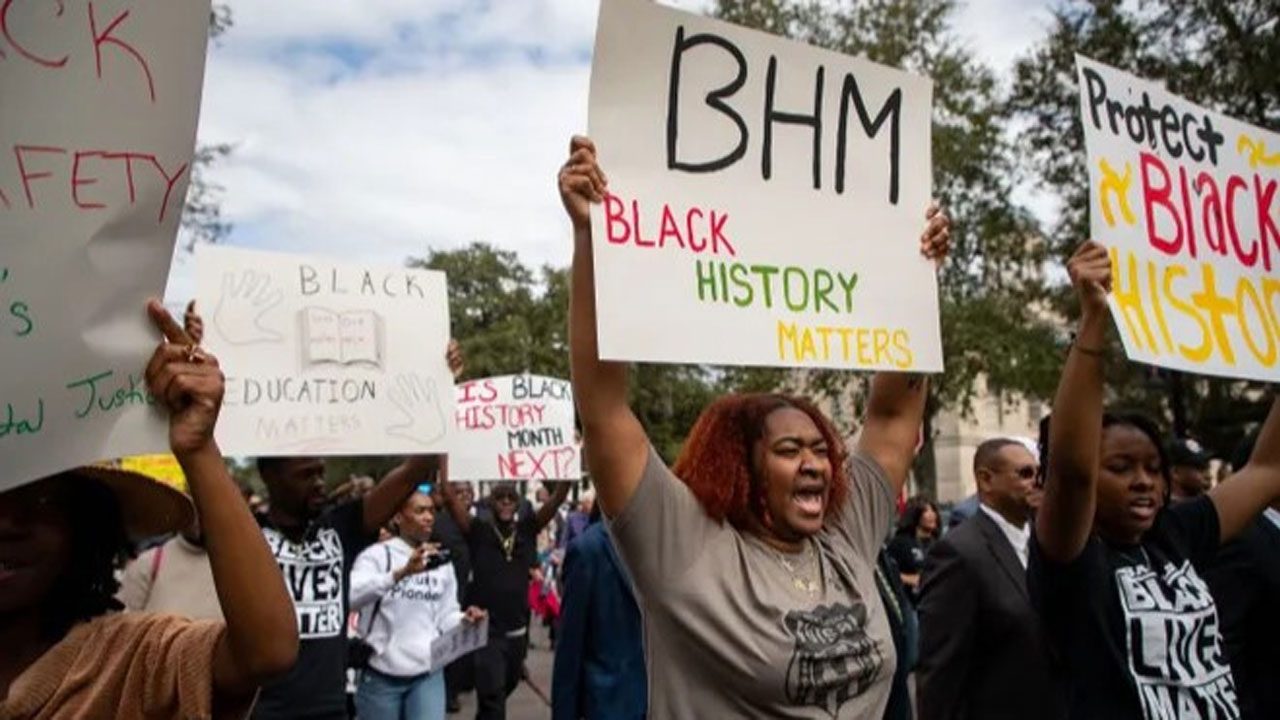As demand for AP African American Studies curriculum surges across US, Florida ban remains
Sarasota Herald-Tribune | By Alia Wong and Ana Goñi-Lessan | July 27, 2023
AP African American Studies arrived last year at 60 schools across the country, and this fall, it will be tested in roughly 800 high schools – twice what was originally planned – thanks to a surge in demand.
Despite that growth and highly publicized revisions to the course, it remains off limits in Florida.
Though the state this week approved its own African American history standards that officials have lauded as the anti-woke approach to teaching about Black experiences in the United States, advocates say the standards whitewash or gloss over key aspects of that story.
The upshot: Possibly hundreds, or thousands, of Florida high school students whose hopes of taking a complex, college-level version of African American history have been dashed amid a political tug-of-war.
Florida vs. the College Board
AP courses are college-level classes for high schoolers who, depending on how they perform on an end-of-year exam, can earn college credit for doing so. College Board, the nonprofit behemoth that administers the AP program, spent more than a decade developing AP African American studies with the help of an interdisciplinary range of scholars and educators.
After test-driving the course in a few dozen schools last year, including a few in Florida, the College Board opened it up to a second pilot year and set a deadline of Jan. 30, 2023, to sign up. The plan was to test it out in about 400 schools this fall.
Then came the rejection in Florida: In mid-January, days before that deadline, Florida’s Department of Education banned the class. It is “inexplicably contrary to Florida law and significantly lacks educational value,” officials said in a letter. They cited topics in the curriculum such as Black Lives Matter, Black feminism and reparations.
The move sparked national outrage – as did College Board’s response, shortly thereafter – to scrub certain content with which Florida officials had taken issue. The College Board then revised the curriculum yet again, reincorporating some concepts and apologizing for its handling of the dispute.
Demand for AP African American Studies soars
The Florida education department and College Board have since feuded over at least one other course, AP Psychology. The course includes discussions of sexual orientation and gender identity, which Florida law now restricts. In this instance, the College Board declined to modify the AP Psychology content.
As all of this was happening, demand for the AP African American Studies course kept growing. A list of schools that missed the deadline formed, and ultimately, every school on it was able to offer it this fall. As of this month, schools in at least 32 states plan to participate, College Board spokesperson Kelsey Lehtomaa Frouge said. An estimated 16,000 students will take it.
Despite initial indications that it was open to reconsidering the course, Florida isn’t one of those states.
When asked about the status of AP African American Studies in Florida, Lehtomaa Frouge recommended that USA TODAY reporters reach out to the Florida Department of Education. “College Board has not received any additional correspondence to suggest Florida has reversed its decision,” she said.
The state, meanwhile, said “The College Board never submitted the revised version for consideration.”
In response, Lehtomaa Frouge said: “We have not determined a timeline for releasing the revised framework to states for review. Once the framework is completed, we will then determine our next steps for engaging with states.”
Roughly half a dozen of Florida’s largest school districts said in emails to USA TODAY that they are still unable to offer it, though some of their responses, too, were vague. Some told reporters to confirm with the state. A few weren’t certain that pilot testing of the course was continuing. Others said the course wasn’t yet approved and there was no course code offered by the Florida education department for AP African American Studies.
Backlash against Florida’s African American history standards
Florida Gov. Ron DeSantis and other state leaders have defended their rejection of the College Board course by saying state law already requires teaching African American history. That law, passed in 1994, created the African American History Task Force and requires instruction on the history, culture, experiences and contributions of African Americans in the state’s K-12 curriculum.
“Despite the lies from the Biden White House, Florida rejected an AP course filled with Critical Race Theory and other obvious violations of Florida law,” tweeted Education Commissioner Manny Diaz Jr. in January, referring to White House comments that the state was blocking the study of Black Americans.
“We proudly require the teaching of African American history,” Diaz Jr.’s tweet said. “We do not accept woke indoctrination masquerading as education.”
Yet advocates say the new standards for teaching that history, adopted this week, leave out Florida’s role in slavery, blame African Americans for being victims of oppression and omit major periods of history. Some argue the standards do little beyond recognizing that racism exists, failing to go into depth about who promoted violence against Black people in the country.
“When you couple these standards with the environment, the hostility towards daring to talk about certain subjects, it creates an environment where there’s going to be a complete removal of these conversations and of these lessons in the classroom, because nobody wants to run afoul of all of the laws or policies that have been put in place,” said Genesis Robinson, political director for advocacy group Equal Ground.
Among opponents’ concerns:
- Elementary and middle school students are not required to learn about African American history after Reconstruction, the era following the Civil War.
- The middle school curriculum notes that instruction should include “how slaves developed skills which, in some instances, could be applied for their personal benefit.”
- In high school, when learning about the Ocoee Massacre, students are expected to learn about “acts of violence perpetrated against and by African Americans.”
The Ocoee Massacre is considered the largest incidence of voting-day violence in U.S. history, according to the Orange County Regional History Center. In 1920, Mose Norman, a Black man, tried to vote but was turned away from the polls. Later that night, a white mob tried to find Norman and ended up surrounding his friend’s house. That friend, July Perry, was lynched. Other Black community members were murdered and their houses burned. Most of the Black community fled Ocoee and never came back.“When you look at the history currently, it suggests that the (Ocoee) massacre was sparked by violence from African Americans,” said Sen. Geraldine Thompson, an Orlando Democrat, referring to the state’s new standards. “That’s blaming the victim.”
African American History Task Force Chairperson Glen Gilzean defended the group’s efforts.
“Black history is American history, and we’ve heard that repeated time and time again this morning,” Gilzean said Wednesday. “Let’s be clear: Florida already requires the teaching of African American history, but the new standards align these requirements and will hold teachers accountable to ensure that complete and accurate African American history continues to be taught.”
‘It just hurts me:‘ Florida students left frustrated
Victoria McQueen, 17, of Tallahassee, Florida, was looking forward to taking AP African American Studies her senior year. She said that when she heard the class was rejected by the DeSantis administration, she felt defeated.
“It just hurts me, especially as a young African American female, that 400 years later they’re still trying to sweep the history of African Americans under the rug after all they did,” the rising senior said. “The way that America has broken African Americans and people of color in general, broken them down from top to bottom, not giving them the credit they deserve behind the scenes and in front of the camera − it just hurts to know that even in the classroom they can’t be acknowledged.”
McQueen, who is her high school’s student body president, already has taken six AP classes. When she realized AP African American Studies wouldn’t be offered, she looked into learning the subject matter in an actual college course.
“I took it upon myself to see if I could take it at the community college, only for me to find out a few months later, these last few months, that the state is now regulating what even the colleges can teach about African American history and diversity because of critical race theory,” she said.
DeSantis, who is running to be the Republican nominee for president, has cracked down on diversity, equity and inclusion programs on Florida college campuses. The governor recently signed a bill that restricts state funding from going to any programs or campus activities “based on theories that systemic racism, sexism and privilege are inherent in the institutions of the United States and were created to maintain social, political and economic inequities.”
McQueen’s high school sits about a mile away from the Florida Capitol and the state Department of Education building. She said she wishes state leaders would listen to students.
“Ask the students if they want the class,” she said, “not the parents, the students, because the parents aren’t sitting in the classroom every day.”






